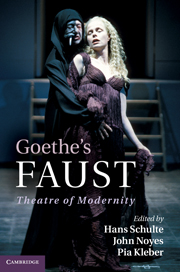Book contents
- Frontmatter
- Contents
- List of illustrations
- List of contributors
- Preface
- List of abbreviations
- Introduction
- PART I MODERNITY
- 1 Faust – today
- 2 Mephisto and the modernization of evil
- 3 Mephisto is the devil – or is he?
- 4 ‘Schwankende Gestalten’: virtuality in Goethe's Faust
- 5 Amnesia and anamnesis in Goethe's Faust
- 6 Magicians of modernity: Cagliostro and Saint-Simon in Goethe's Faust II
- 7 The blind Faust
- 8 From Faust to Harry Potter: discourses of the centaurs
- 9 Mistra and the Peloponnese in Goethe's Faust II
- 10 Goethe and the grotesque: the ‘Classical Walpurgis Night’
- 11 Re-defining classicism: antiquity in Faust II under the sign of the Medusa
- 12 Diabolical entrapment: Mephisto, the angels and the homoerotic in Goethe's Faust II
- PART II THEATRE
- Select bibliography
- Index
- References
9 - Mistra and the Peloponnese in Goethe's Faust II
Published online by Cambridge University Press: 01 June 2011
- Frontmatter
- Contents
- List of illustrations
- List of contributors
- Preface
- List of abbreviations
- Introduction
- PART I MODERNITY
- 1 Faust – today
- 2 Mephisto and the modernization of evil
- 3 Mephisto is the devil – or is he?
- 4 ‘Schwankende Gestalten’: virtuality in Goethe's Faust
- 5 Amnesia and anamnesis in Goethe's Faust
- 6 Magicians of modernity: Cagliostro and Saint-Simon in Goethe's Faust II
- 7 The blind Faust
- 8 From Faust to Harry Potter: discourses of the centaurs
- 9 Mistra and the Peloponnese in Goethe's Faust II
- 10 Goethe and the grotesque: the ‘Classical Walpurgis Night’
- 11 Re-defining classicism: antiquity in Faust II under the sign of the Medusa
- 12 Diabolical entrapment: Mephisto, the angels and the homoerotic in Goethe's Faust II
- PART II THEATRE
- Select bibliography
- Index
- References
Summary
INTRODUCTION
The year 1204 and the Frankenburg of Mistra
By 13 April 1204, the so-called crusaders had conquered Constantinople, the capital of the Byzantine empire, which they systematically plundered over the course of the following days. The area of the former empire was carved up by the victors, each of whom tried to obtain as much as possible. The Greeks had withdrawn to Asia Minor to found the empire of Nikaia-Nymphaion, and it was not until 1261 that Emperor Michael VIII Palaiologos could take his capital back.
The Peloponnese peninsula had also fallen to the crusaders and was granted to the Villehardouin family. In 1249, Wilhelm II de Villehardouin built a Frankish fortress above the city of Mistra, 7 kilometres north-west of Sparta. But already in 1261 or 1262, William, Prince of Achaia, had to relinquish the fortress to the emperor. Therefore, relatively soon after its foundation by the Franks, the fortress became Greek and was to remain so until 1460. In the political reality of the thirteenth century, Greek and Frankish culture came together in the town of Mistra. It is this fortress that qualified as the location of Goethe's third act of Faust ii. Goethe never mentions Mistra, only Sparta. But it is clearly Mistra that he intends.
Goethe and Mistra
Already towards the end of 1800, Goethe had intensively studied the history of Sparta. We know, for, example, that he read La Guilletière's Lacédémone ancienne et moderne at that time.
- Type
- Chapter
- Information
- Goethe's FaustTheatre of Modernity, pp. 129 - 137Publisher: Cambridge University PressPrint publication year: 2011



